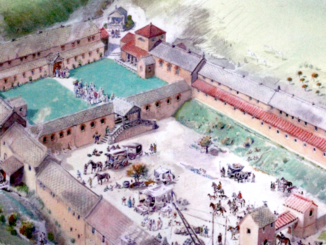
Like others of our more important historians (Macaulay, Starkey), Gibbon wasn’t a professional academic. He was a gentleman, and an amateur, in the best sense. Early in his career he found the thing he most loved, and gave himself, heart and soul to it. And, having completed his epoch-making The History of the Decline and Fall of the Roman Empire, within a few years died. The story of his masterpiece is the story of his life. Astonishingly, after nearly 250 years, his work remains an essentially reliable guide to his subject, even if his strong prejudices (never hidden) aren’t always shared.
His life is briefly told. He was born in Putney, then outside London, in 1737. The family were wealthy, if neglectful. He spent just fourteen months at Magdalen College Oxford – of which he thought little. Of the old soaks at the top table he wrote “From the toil of reading, or thinking, or writing, they had absolved their conscience; …… Their conversation stagnated in a round of college business, Tory politics, personal anecdotes, and private scandal: their dull and deep potations excused the brisk intemperance of youth: and their constitutional toasts were not expressive of the most lively loyalty for the house of Hanover.” That is, they were a bunch of red-nosed sinecurists, still dreaming of a Jacobite restoration.
A temporary conversion to Roman Catholicism, followed by an enforced sojourn in Protestant Lausanne eventually left him an avowed unbeliever, and his disapproval of churchmen, if not of Christianity itself, is one of the recurring themes of his writing. Lausanne gave him the outward looking and European education Oxford failed to deliver.
And, unlike his university career, he greatly valued his active spell in the militia.
Later, though twice elected an MP, he failed to cut a figure as a politician, and usually played the part of a biddable backbencher. His life, from the mid 1760s, to the end of the 1780s, was dominated by researching and writing his magnum opus.
Gibbon’s health was declining rapidly in the 1790s, and apart from revising his memoirs, he wrote little enough else of note. He died in 1794. Throughout life he enjoyed the patronage and friendship of John Baker Holroyd, first Earl of Sheffield, a prominent politicician and vocal supporter of the rights of slave owners (1) Sheffield would bury Gibbon with his own family at Fletching, E. Sussex, and would subsequently collect and publish Gibbon’s miscellaneous works (two volumes, quarto 1796; five volumes octavo 1814)
The History of the Decline and Fall of the Roman Empire

In his brief autobiography, one of the most notable in the language, he tells us that “It was at Rome, on the fifteenth of October 1764, as I sat musing amidst the ruins of the Capitol, while the barefooted fryars were singing Vespers in the temple of Jupiter, that the idea of writing the decline and fall of the City first started to my mind”.
He had already written on a variety of historical subjects, though few of these minor works were published in his lifetime. He was never less than industrious, and these essays, frequently written in French, fill five volumes in Lord Sheffield’s revised collected edition of 1814.
He now embarked on the massive undertaking – a narrative history of the Roman Empire from its heyday in the second century A.D. , through the crisis of the third century, Christianization in the fourth, and thereafter the gradual disintegration of Roman authority in western Europe, and the establishment of the Germanic Kingdoms that would usher in the European Middle Ages. The main theme of the work is then the remaining half of the empire, centred on the imperial capital at Constantinople, the modern Istanbul. This state, which would endure for another thousand years, increasingly Greek in speech and culture though it was, is often misrepresented in the West as “Byzantine” – a word its inhabitants and rulers never used of themselves – in an attempt to deny its Roman identity.
The history of the Eastern Empire had received little enough attention in the West. Catholics felt uncomfortable with the perception that Orthodox Christianity was at least as old and authentic as their own faith; the fact of a legitimate Roman Empire in the east somehow called into question the purported sovereignty of western European nations (particularly the preposterous claim of German princelings to be Roman Emperor, holy or otherwise), and the history of that Empire was largely written in Greek, a language inaccessible to most western scholars (2). And there was perhaps also a sense of guilt about the betrayal of a great Christian civilization by the West. All the same, it is a source of regret that Gibbon failed to understand the Eastern Empire, and was too ready to write it off as “a tedious and uniform tale of weakness and misery” a judgement that was as influential as it was wrong-headed.

The first volume appeared in 1776. As was usual with important works it was published in quarto, that is a large volume. These things were very expensive, and even comfortably off readers would have to wait for the first smaller format edition of 1783 (completed 1790). The first instalment caught the public’s imagination, and was twice reprinted, making the author a good deal of money. The transgressive tone perhaps appealed to enlightenment readers. Two more quarto volumes appeared in 1781, and the final three in 1788-9.
The thing that marks Gibbon apart is not only the scale of his enterprise, but his incredible grasp of the original sources, and thoroughness in setting out in comprehensive detail his narrative. Even if his judgement falters, his marshalling of fact almost never does.
Boswell may have decried the work and despised the man. But contemporaries like David Hume, Principal Robertson, and Adam Ferguson (all notable historians themselves) lauded Gibbon’s historical achievement.

Christianity and the Decline thesis
Few historical writers are as passionately devoted to their theme as Gibbon. Gibbon had become a Roman, wholly committed to the past glory of Rome. And his quest was to explain why his immense, powerful, cultured empire was gone.
In Chapters XV and XVI Gibbon scandalously denied the historical truth of the persecutions of early Christians, generally accepted for more than a thousand years, and then put forward his most original, and at the time controversial thesis – that the adoption of Christianity precipitated the decline of the Empire. French writers had been softening up their audiences with atheism and hostility to Christianity for some time, but this was relatively new in Britain, (though everyone knew Hume was an unbeliever) and provoked a reaction which would go on for years. Ironically, today no one really credits this thesis – after all the still somewhat pagan provinces of the West crumbled, while the entirely Christian East endured – but the intellectual challenge of seeing in a cultural and social shift the underlying motor of historical change was impressively modern.
St George and the bacon
The assault on Christianity isn’t confined to those two chapters. The work abounds with villainous popes, absurd saints, gormless piety, and barely disguised ridicule of traditional Christian observance. So Gibbon couldn’t resist an opportunity like equating the detestable figure of the historical George of Cappadocia, a fourth century Archbishop of Alexandria with England’s patron saint. The account in Chapter 23 is a tour de force of provocation and scurrility. Here’s an extended quotation – an opportunity to sample his mature style.
“George …… was born at Epiphania in Cilicia, in a fuller’s shop. From this obscure and servile origin he raised himself by the talents of a parasite; and the patrons whom he assiduously flattered procured for their worthless dependent a lucrative commission, or contract, to supply the army with bacon. His employment was mean; he rendered it infamous. He accumulated wealth by the basest arts of fraud and corruption; but his malversations were so notorious, that George was compelled to escape from the pursuits of justice , …….. From the love, or the ostentation, of learning, he collected a valuable library of history, rhetoric, philosophy, and theology; and the choice of the prevailing faction [in the Church] promoted George of Cappadocia to the [archbishop’s] throne of Athanasius. The entrance of the new archbishop was that of a barbarian conqueror; and each moment of his reign was polluted by cruelty and avarice. The Catholics of Alexandria and Egypt were abandoned to a tyrant, ……… The primate of Egypt assumed the pomp and insolence of his lofty station; but he still betrayed the vices of his base and servile extraction. The merchants of Alexandria were impoverished by the unjust and almost universal monopoly, which he acquired, of nitre, salt, paper, funerals, etc.: and the spiritual father of a great people condescended to practice the vile and pernicious arts of an informer. ……. Under the reign of [Emperor] Constantius [II] he was expelled by the fury, or rather by the justice, of the people; and it was not without a violent struggle that the civil and military powers of the state could restore his authority, and gratify his revenge. The messenger who proclaimed at Alexandria the accession of [Emperor] Julian [the Apostate] announced the downfall of the archbishop. …….At the end of twenty-four days the prison was forced open by the rage of a superstitious multitude, impatient of the tedious forms of judicial proceedings. The enemies of gods and men expired under their cruel insults; the lifeless bodies of the archbishop and his associates were carried in triumph through the streets on the back of a camel……… The remains of these guilty wretches were thrown into the sea; and the popular leaders of the tumult declared their resolution to disappoint the devotion of the Christians, and to intercept the future honours of these martyrs, who had been punished, like their predecessors, by the enemies of their religion. …… The odious stranger, disguising every circumstance of time and place, assumed the mask of a martyr, a saint, and a Christian hero…….. and the infamous George of Cappadocia has been transformed into the renowned St. George of England, the patron of arms, of chivalry, and of the garter.”

Keeping Gibbon locked away
The mention of the sexual mores of the pre-Christian Empire, the whorish (allegedly) Empress Theodora, and the Pornocracy provoked nervousness among contemporaries, and Gibbon actually goes out of his way to reassure readers “My English text is chaste, and all licentious passages are left in the decent obscurity of a learned language.” In other words, a proficient reading knowledge of Ancient Greek was required to appreciate the mucky bits.
Nonetheless the combination of irreligion and reputed smut put Gibbon under a permanent cloud. Such was the concern about distasteful content that Dr Thomas Bowdler (the author of the ludicrous “Family Shakespeare” and origin of the expression “bowdlerize”) prepared an expurgated version of the history (with the snappy title “Gibbon’s History of the Decline and Fall of the Roman Empire : For the use of Families and Young Persons, Reprinted from the original text with the careful omission of all passages of an irreligious or immoral tendency”), published posthumously in 1826. And that habit of censoring persisted throughout the nineteenth century.
As late as the 1970s my school library kept their edition of The Decline and Fall under lock and key. I had to ask permission to read it, and the librarian eyed me suspiciously as though I only wanted to read the salacious passages. (3)
Gibbon really doesn’t have the power to shock any more. I don’t think many Christians are affronted by Gibbon’s irreligious attitudes, which now seem somewhat juvenile and quaintly eighteenth century. And in our debased times, those dirty bits are not enough to titillate. The court of Elagabalus could readily pass for G.P. on a Friday night; Theodora certainly wasn’t the last ageing strumpet to marry royalty. And I’m still not explaining Pornocracy, surely one of the best and most unjustly neglected words in the dictionary.

Reading Gibbon today
With Macaulay, Gibbon straddles the worlds of historical and literary greats. There may be more analytical histories of the empire to be had today, even if Gibbon’s narrative is very seldom wrong. But the joy of Gibbon is in the magnificent, resounding prose, and in the lively, often witty, footnotes that abound. It was that extraordinary sonorous style that knocked the young Winston Churchill sideways, and became the model on which he would fashion his own rhetorical style “I set out upon…Gibbon’s Decline and Fall of the Roman Empire [and] was immediately dominated both by the story and the style. …I devoured Gibbon. I rode triumphantly through it from end to end and enjoyed it all.” (4) For that reason, ‘cleaned up’ or ‘modernised’ editions have little to recommend them. Sadly, the Folio Society’s nicely printed edition, often to be found in second hand bookshops, though illustrated with attractive engravings, unforgivably omits most of the author’s footnotes.
Eighteenth century octavo editions (published by Strahan & Cadell) no longer turn up cheap, but an early set of J B Bury’s scholarly edition (seven volumes 1896-1900, and subsequent printings) can be had off the Advanced Book Exchange. Dent’s Everyman edition also reprinted the Bury text. There’s a much more recent edition by Womersley, which was not complete when last I looked.

(1) Lord Sheffield was a direct ancestor of Polly Toynbee. She’s usually missing when her fellow idiots start yammering for reparations for slavery. Perhaps this is why.
(2) Gibbon quotes Greek sources throughout the work. But he was not much of a Greek scholar, and in fact depended heavily on Latin translations of the writers he was using.
(3) Evidently not all schoolmasters are fools.
(4) See also https://winstonchurchill.org/the-life-of-churchill/young-soldier/1896-1900/winter-1896-97-age-22/
© Snoffle Gronch 2020
The Goodnight Vienna Audio file
Audio Player



